

 Vol. 39 (Number 30) Year 2018. Page 15
Vol. 39 (Number 30) Year 2018. Page 15
Natalya F. VINOKUROVA 1; Anastasia V. ZULKHARNAEVA 2; Irina Yu. KRIVDINA 3; Natalia V. MARTILOVA 4; Mikhail M. BADIN 5; Valeriy A. SHEMANAYEV 6
Received: 05/03/2018 • Approved: 29/04/2018
ABSTRACT: The relevance is determined by the need to address ecological and social problems of a global nature, the lack of elaboration of this problem in the theory and methodology of school educational disciplines and the difficulty of teachers in developing and implementing a pedagogical model for the formation of ecological values of sustainable development in upper secondary school students. The study proved the effectiveness of the methodology for the formation of values of sustainable development in upper secondary school students. |
RESUMEN: La relevancia está determinada por la necesidad de abordar problemas ecológicos y sociales de carácter global, la falta de elaboración de este problema en la teoría y metodología de las disciplinas educativas escolares y la dificultad de los docentes en desarrollar e implementar un modelo pedagógico para la formación de valores ecológicos del desarrollo sostenible en estudiantes de secundaria superior. El estudio demostró la efectividad de la metodología para la formación de valores de desarrollo sostenible en estudiantes de secundaria superior |
The 21st century goes down in history as a period that puts humanity on the brink of survival in the face of a global ecological and social crisis. It is obvious that the condition for overcoming the crisis is the replacement of the modern system of relations between individual and the surrounding natural and social environment.
In the documents of international conferences on global humanity problems (the Rio Declaration on Environment and Development (1992), the Johannesburg Declaration on Sustainable Development (2002), the UNECE Strategy for ESD (2005), the Road maps of the implementation of the Global Program of Action for Education for Sustainable Development (UNESCO) (2014), emphasizes the ideas of sustainable development as a new value basis for human relations and socio-natural reality.
Education, as one of the spheres of human detail, determining the future of the world community, has a major role in formation the values of sustainable development of the younger generation (Mertig, A., Jones, R.E., 2000, Qingqing Han, 2015, Shireen Fahey, Luke Verstraten, Ashton J. Berry, 2016, Robert Laurie, Yuko Nonoyama-Tarumi, Rosalyn Mckeown, Charles Hopkins, 2016, Karpiak, C.P. & Baril, G.L., 2008., N.M. Mamedov, 2003, N.F. Vinokurova, 2003-2017, Zulkharnaeva A.V., 2005-2017).
Analysis of psychological-pedagogical study (Rubinstein S. L, 1958, Myasishchev VN, 2004, Milton Rokeach, 1973) showed that values determine the cognitive, communicative, and practical activity of a human in building relations with the world as a socio-natural reality. Accordingly, the ecological values of sustainable development, which are based on ideas of parity of the parties of the world relation, co-creation of human and nature, tolerance, empathy, recognition of the universal value of nature (A.A. Gorelov, 2010, N.M. Mamedov N. M., Gay W. C., Chumakov A. N., 2009, Ursul A.D., Ursul TA, Dugarova M., 2017), form the personality, the whole spectrum of relations with the world of which will be directed to harmonious co-development. A significant potential in solving this problem belongs to the geography of both science and education. The object of study of geography is landscapes of various territorial ranks (global, regional, and local). They represent a socio-natural reality, to which the cognitive, communicative, practical types of human activity are directed.
In the world pedagogical practice, studies are presented that reveal the diagnosis of a human's relations to the surrounding socio-natural reality (Florence Le Hebel, Pascale Montpied, Valérie Fontanieu, 2014, Jenkins, E.W., Pell, R.G., 2006, Kasser, T., 2011). The publications have developed pedagogical models aimed at developing ecological relations to the surrounding nature, the formation of ecological responsibility ((Erdogan, M., Usak, M., Bahar, M., 2013, Ajiboye, JO, & Silo, N., 2008, Bogner, F.X., 1998, Demidova N.N., 2013, Vinokurova N.F., Loshchilova A. А., 2017).
At the same time, it is possible to single out a number of problems hindering the effective formation of ecological relations among upper secondary school students by means of school geography:
- The predominance of material values among students, an objective and pragmatic relation to nature, the position of the consumer when interacting with it;
- Insufficient realization of the potential of geographic education in the formation of ecological values of sustainable development;
- The lack of an integral pedagogical model in geographic education aimed at the formation of ecological values of sustainable development;
- Difficulties among teachers of geography in planning and implementing the educational process for geography with the purpose of formation of ecological values of sustainable development.
The materials in this article are aimed at overcoming these problems. In the course of the study, a hypothesis related to the identified contradictions was identified and assuming that the formation of ecological values of sustainable development in upper secondary school students in geography training will be effective if:
- The theoretical-methodological and specific-methodical levels of solving the study problem will be refined;
- The study will reflect the axiological trend of the development of global education in the mainstream of the idea of sustainable development, as well as the mission of education in its achievement;
- The selection and structuring of content will be carried out in the context of the unity of scientific and geographical, spiritual, moral, technological foundations, which reflects all spheres of the consciousness of the personality;
- A substantive, procedural, and performance-evaluation aspect will be combined in the pedagogical model, which implies the inclusion of the student in cognitive, communicative, and practice-oriented activities, based on the ecological values of sustainable development.
Within the framework of the hypothesis put forward, a study was carried out, the results of which are presented in this article.
The following methods were used during the study: analysis and generalization of literature on the problem under study, modeling, design, pedagogical observation and experiment, testing, questioning, conducting control sections, diagnostic techniques, interviews with teachers and students, analysis of intellectual products of upper students, forecasting, systematization and generalization of facts, tabular interpretations data.
Pilot testing was carried out in the Russian upper secondary school No. 1, 46, 151, 186, gymnasium No. 80 of Nizhny Novgorod The pedagogical experiment involved upper secondary school students (15-17 years), the number of participants - 150 humans, and participation was conscious and voluntary.
The duration of the work on the problem is 20 years. The study was conducted in three stages.
At the first stage (the preparatory stage), the analysis of the study problem in pedagogical theory and practice was carried out. The purpose, object, subject, problems of the study were determined, and a working hypothesis was formulated. The questioning of teachers was conducted with the purpose of revealing their interest and readiness to form in students ecological values of sustainable development in school geographic education. The technique of the ascertaining experiment was determined; the organization of experiment was organized in the Russian secondary schools of Nizhny Novgorod.
To determine the ecological values of sustainable development in upper secondary school students in geography training, the criteria were determined.
The indicator of completeness became the criteria for assimilation of the content aspect of the ecological values of sustainable development (Lerner, I.Ya., 1978). Signs of completeness of mastering knowledge about the ecological values of sustainable development include the ability of the student to list ecological ideas, to give definitions of each of them, to characterize the main provisions and signs. With the full correct answer, all the above signs are present; with the correct incomplete response, inaccuracies in the main provisions and signs of the subject are allowed; with an inaccurate answer, there is a general idea of each of the characteristics; the answer is absent or the student does not name the definition and attributes of the object.
The value relation to nature as an internal quality of the student's personality was studied based on the modality criteria (Yasvin I.Ya., Deryabo S.D., 1996) on the parameters: object-pragmatic relation, object-non-pragmatic relation, subject-pragmatic relation, subject-non-pragmatic relation (table 1).
Table 1
Types of the modality relation to nature
Modality type |
Perception of a natural object |
Interaction with a natural object |
Object-pragmatic |
objective |
Satisfaction of the pragmatic needs of the personality, the lack of a value relation. |
Object-nonpragmatic |
objective |
Based on the lack of recognition of the value and interaction motive |
Subject-pragmatic |
subjective |
Based on the recognition of value in terms of its utilitarian utility |
Subject-nonpragmatic |
subjective |
Based on the recognition of inherent worth |
The same criteria of dominance, characterizing the place of ecological values of sustainable development, were used in the hierarchy of other value relation (high rank, average rank, low rank, insignificant). Students were asked to rank values according to internal guidelines (Milton Rokeach, 1973, Yasvin I.Ya., Deryabo S.D., 1996).
Practical implementation of values of sustainable development was diagnosed based on the criteria of principledness, expressed in the ability of students to participate in the process of dialogic communication. Dialogue assumes the allocation of levels: individual-cognitive (characterized by the disengagement of individuality, the “materialization” of the monologue, the awareness of the value of the dialogue); collective-analytical (characterized by the experience of cooperation, collective interaction); personally-reflective (characterized by a high level of self-organization of the personality, understanding of the “significant other”, understanding oneself as part of the content of the life of others and awareness of the problem of education in connection with this as an attachment to ecological values).
Diagnostics of principledness as an indicator of the practical manifestation of values in the immediate environment of the personality is based on the correlation of the motive and purpose of the activity. Given this compliance, there are several levels: low level (expressed in the absence of an activity manifestation of the relation caused by the external form of motivation); average level (expressed in the passive activity manifestation of the relation, is determined by the shift of the motive to the purpose of the activity); high level (expressed in the active activity manifestation of the relation on the basis of the coincidence of the internal motive and the purpose of the activity).
Within the framework of these criteria, diagnostic tasks were developed and the initial level of diagnosed indicators was established, which allowed to determine the initial data for further pedagogical study.
At the second stage (the main stage), the accumulated theoretical and empirical material was systematized, on the basis of which the pedagogical model of the formation of ecological values of sustainable development in upper secondary school students in geography training.
Pedagogical model of the formation of ecological values of sustainable development in upper secondary school students in geography training was developed and tested at two levels: theoretical-methodological and methodological.
Theoretical-methodological level consisted of ideas of sustainable development, co-evolution of human and nature, noosphere, co-creation of human and nature, universal value of nature, ecological, personality-oriented education (Karpinskaya R.S., 1995, Kogai E.A., Kondratiev K.Ya., Peccei A.1975, Schweitzer A., 1985).
The methodical level presupposed the definition of the purpose of instruction, the selection of the content and the sequence of its study, pedagogical technologies, and methods of instruction.
The purpose involves the formation of ecological values of sustainable development in upper secondary school students in geography training. This process involves the interrelated development of the cognitive, affective, and volitional spheres of the student's personality consciousness: the development of ideas about the ecological values of sustainable development, the value ecological relation to the socio-natural reality, the realization of the values of sustainable development in practical ecological activities as the basis for the strategy of interaction with nature.
As the objects of study, the geographical envelope and the modern landscape of their locality were chosen. The geographical envelope is a complex combination that includes the natural component in conjunction with the manifestations of human activity. The modern landscape represents the immediate environment of the personality, the object of direct interaction.
Structuring of the content takes into account the dialectics of human interaction and objects of socio-natural reality - the geographical envelope and the modern landscape of its terrain: universal value - types of human impact - changes, because of impact - ecological consequences - ways to harmonize human-nature relations. Particular importance is attached to the axiological focus of the content of geographic education. Students are offered to study a number of value ideas: sustainable development, noosphere, co-evolution, universal value of nature, indispensability of the biosphere. Assimilation of value ideas ensures their transition to the inner world of the personality. In the methodological plan, this process involves the formulation of an objective information form of an idea (OIF) and a subjective-valuation (SVF). The latest provides a change in value orientations, as it forms an experience and an understanding of the significance for the personality (Table 2).
Table 2
Ecological values
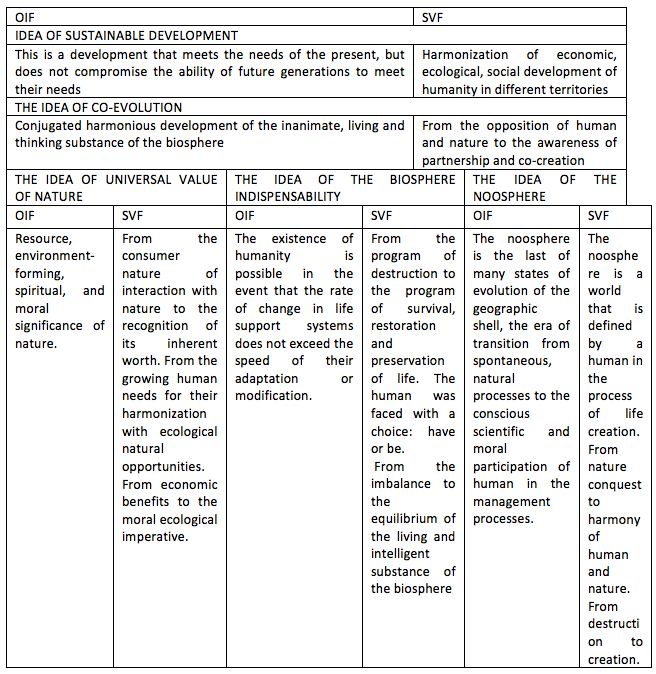
OIF is the objective information form, SVF is subjective-valuation form.
The content of geographic education should reflect the nature of the realization of values of sustainable development in human activities. Consequently, in the content of school geography in the upper grades, methods and models of economic justified interaction with the nearest ecological (local level - that part of the geographical envelope in which the human lives) are introduced.
As the basic pedagogical technology of formation of ecological values of sustainable development in upper secondary school students in geography-training the personal ideological-oriented situation is applied. The problem of the personal worldview-oriented situation is the replacement of the established consumer values of the personality with the ecological values of sustainable development. The residence of a personality in this situation is a successive change in the following phases:
Motivational phase - students make the decision to get involved in the resolution of the situation, because they experience the experience and the contradiction between the inadequacy of the proper and the real;
Emotional-value phase - is based on the transformation of external objective contradiction into the internal, accompanied by the experience of the content kernel of the situation; choice of ways to resolve the situation in accordance with the new value basis;
Intellectual-effective phase reflects the selection of tools aimed at resolving the situation (campaigns, methods, means) and the actions of the personality in resolving the situation;
Reflexive-evaluative phase presupposes self-evaluation of its actions to resolve the situation, correlating the result with the newly acquired values and meanings, which form the basis for interaction with the surrounding world.
In the pedagogical model, three types of situations are presented, corresponding to each stage of formation of ecological values of sustainable development. The personal worldview-oriented situation “Experience and denotation” corresponds to the problems of the first stage and is aimed at “reassessing” existing personal values and defining new moral guidelines of an ecological nature. At the second stage, the personal worldview-oriented situation “Awareness and understanding” is included in the educational process, assuming a “revision” of the meaning; at the third stage - personal worldview-oriented situation “Self-regulation and creation”. It helps reflection of the student's practical activity, to understand its inconsistency with new meanings, and to reorient to create with a socio-natural reality.
The resolution of the situation takes place in the process of dialogue between students. In the dialogue there is a social and personal realization of the ecological values of sustainable development. In the pedagogical model, several types of dialogue are used, the criteria for singling out which is the individual path of personal development (Belova S.V., 2002):
motivational is characterized by readiness for contact, acceptance of “on faith” values of dialogical relations;
self-presenting reflects the personality need to demonstrate his individuality, uniqueness, values;
autonomous reflects the ability of the personality to translate the external content indicated in the inner world and conduct an internal dialogue;
critical is characterized by the presence of different points of view, different meanings, prompts the search for new arguments, positions, hypothetical consideration of the solution of the problem;
conflict is characterized by the contradictory nature of the relation of the personality to the subject of the problem;
reflexive is determined by the presence of feedback between the subjects of the dialogue;
Self-fulfilling involves the disclosure of one's creative potential in the creation of an object and relations;
Dialogue and personal worldview-oriented situation are introduced into the learning process in common, which ensures the preservation of the educational dominant over several lessons and allows realizing the unity, integrity of the selected stage. Considering this, we have developed three consecutive stages that have a specific personal worldview-oriented situation and various types of dialogue.
The sequence of formation of ecological values of sustainable development takes into account the process of transition of values from the objectively existing form to the subjective-regulative (Figure 1).
At the first level, experience and definition of values dominate (Zinchenko V.P., 1991). At the marked level, there is an experience, an emotional perception of the world in the form of figurative representations, and then - the denotation, the rooting of the personality within a certain cultural whole. In the process of denotation, the subject feels his connection with the world, thereby identifying himself in the world, placing personal dominants on knowledge, values, ideas, concepts, every day and scientific knowledge that exist objectively, which must be learned and appropriated and then built on their basis a strategy of their own interaction with the world.
The second level - awareness and understanding- proceeds from an understanding of personal meaning, reflecting the attitude of the personality to life values. At the noted stage the person awareness and understands knowledge and values, they become personal property and take a subjective form. The meaning is extracted from a specific situation in which the spectrum of potential senses is represented; only one is selected by consciousness, which agrees with the internal attitudes.
The third level - self-regulation and creation - is associated with the realization of personal senses, since the meaning should not only be found, but also realized, its realization is connected with the human's realization of himself. Values in this context assume a regulatory form, based on which the personality forms the strategy of his behavior in the world.
Figure 1
Stages of the transition of ecological values of sustainable development into the inner world of the personality
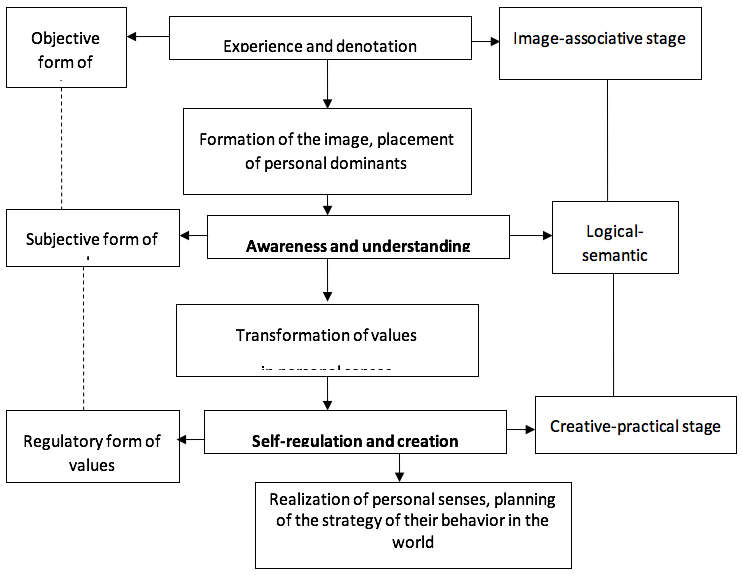
Given these levels in the formation of ecological values of sustainable development, there are three stages: image-associative, logical-semantic, creative-practical.
The first stage - image-associative - is aimed at the formation of ideas and experiences of ecological values of sustainable development. To ensure this process in the lessons, methods of figurative cognition are used: the creation of drawings, stories, descriptions, imaginative mental maps of the geographical envelope and the modern landscape of their locality. It is advisable to use excursions to the landscape of the nearest environment of students as a socio-natural reality, which is an object, a source of experience. As part of the excursion, special importance is attached to methods and forms that ensure the emotional attractiveness of natural objects (S.D. Yasvin, S.D. Deryabo, 1996):
Ecological identification (it consists in the pedagogical actualization of the person's putting himself into the place of a particular natural object, immersing himself in a situation, the circumstances in which he is),
The method of ecological empathy - presupposes the pedagogical actualization of empathy by the personality of the state of a degraded or harmoniously developing natural object, as well as sympathy for it.
The organization and conduct of the dialogue in the lessons of geography involve participation in motivational and self-presentation dialogues.
The second stage is logical-semantic. At this stage, there is an understanding of the ecological values of sustainable development; the content of geographic education is endowed with a personal meaning, directing cognitive activity taking into account value relations, forming an understandable “reflection” of the geographical envelope and the modern landscape of its locality. The method of ecological associations is used - it is aimed at enriching and deepening the representations of the personality about natural objects and the world of nature. Participation in the dialogue is aimed at acquiring the experience of cooperation, collective interaction in the process of critical, conflict dialogues.
The third stage is creative-practical. It consists in the transformation of landscapes taking into account values that have a personal meaning. At this stage, values become ethical norms, according to which the personality regulates his behavior in the immediate environment - the terrain of his locality. The subject evaluates his activities in the geographical envelope and at a discrepancy with the new ethical norms, changes his behavior towards ensuring harmonious relations between the human and the geographical envelope. Dialogue experience at this stage is determined by a high level of self-organization of the personality, which involves the participation of students in reflexive, self-fulfilling dialogues. It is advisable to use teaching methods that include students in practical activities: design, use of methods for ritualization ecological activities, ecological concerns. Of special importance is the method of creating an “I-image” in the future as an ideal psychological image-model of a human capable of providing sustainable development and acting as a guide and regulator of the behavior of the personality.
Table 3
The sequence of the formation of ecological values of sustainable development
in upper secondary school students in geography training
Stage |
Purpose of the stage |
Personal worldview-oriented situation |
Type of dialogue |
Methods of study |
image-associative |
reorientation of personality values
|
Experience and denotation “I create an image of the geographical envelope and the modern landscape of my locality” |
Motivational “Importance of studying the geographical envelope” self- presenting “What are the values of sustainable development for me personally” |
ecological identification, ecological empathy artistic representation of the geographical envelope creating an image of the world |
logical-semantic |
“Audit” of personal meaning
|
Awareness and understanding “I understand the meaning of the ecological values of human interaction and the geographical envelope (the modern landscape of its locality)”
|
Critical “The transition of the geographical envelope into the noosphere: myth or reality?”
Conflict “Can humanity solve global ecological problems?” |
ecological associations practical work “Harmonious and disharmonious landscapes of the world” |
creative-practical |
reflection of practical activity |
Self-regulation and creation “I create harmony in the geographical envelope and landscape of my locality” |
Reflective “How do I interact with nature?”
Self-fulfilling “My proposals for sustainable development of the landscape of my locality” |
Projects: “Public ecological organization in the territory of my settlement” “Ecological action” method of ritualization ecological activities, ecological concerns |
The pedagogical model of formation of ecological values of sustainable development was introduced by means of special educational disciplines at the students' choice: “Global Ecology”, “Management of Natural Resources”, “Geoecology of the Environment”, “The Edge I Live in” (Zulkharnaeva AV.). These disciplines were proposed in conjunction with the main educational program for the geographic education of upper students.
At the final stage of the introduction of the pedagogical model, the level of formation of ecological values of sustainable development in upper secondary school students in geography training was re-diagnosed in accordance with the selected criteria. To ensure the purity of the experimental data, the experimental and control (where the pedagogical model was not implemented) were subjected to diagnostics.
The results of the experiment demonstrate a significant increase in the number of students who have changed the place of ecological values of sustainable development in the system of utilitarian and pragmatic from the group of insignificant for the “Revision” of the personality to the highest rank of significance - 59%. (Figure 2)
Figure 2
Dominance of ecohumanistic ideas in a system of utilitarian and pragmatic
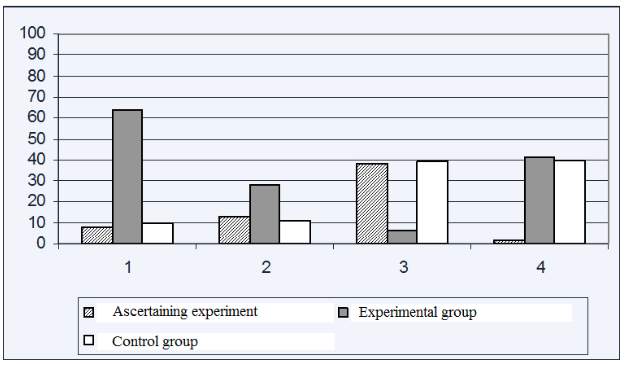
1 - High rank of dominance; 2 - average rank of dominance; 3 - Low rank of dominance; 4 - not significant idea.
In addition, there is a transformation of the students' value relations to nature from the object-pragmatic to the subject-nonpragmatic - 57% (Figure 3). Ability to defend the ecological values of sustainable development in the dialogue has changed from the predominantly individual-cognitive to the leading personally-reflective levels - 51% (Figure 4).
Figure 3
Modality of the value relations to nature
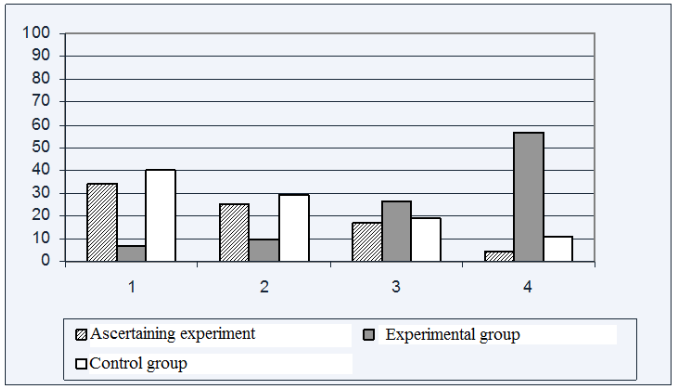
1 - Object-pragmatic; 2- Object-nonpragmatic; 3 - Subject-pragmatic; 4 - Subject-nonpragmatic.
-----
Figure 4
Levels of principledness, expressed in the ability to uphold
the values of sustainable development in dialogue.
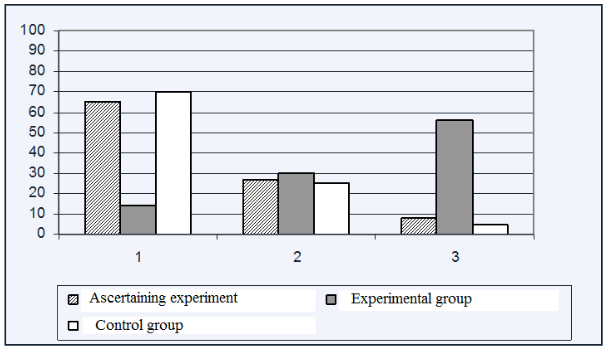
1 - individual-cognitive level; 2 - collective-analytical; 3 - personally-reflective.
Motivation in practical activities of ecological character as practical implementation of ecological values of sustainable development in the vast majority of students has changed from the outwardly set (low level) to the stable internal (high level) - 61%.
Figure 5
Motivation of practical activities of an ecological nature
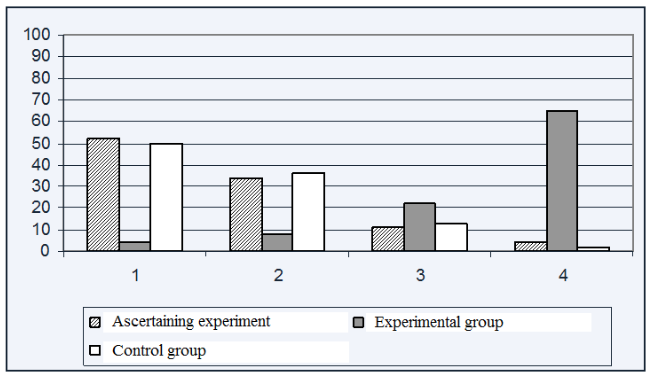
1 - Low level; 2 - Medium level; 3 - High level;
Interpretation of diagnostic results allowed drawing a conclusion about the effectiveness and effectiveness of the pedagogical model.
In the course of the study, the proposed hypothesis was confirmed, the provisions of which constituted the structural and logical basis for the study. The results of the study contain authors' materials of a theoretical-methodological and specific-methodical nature. They are relevant for the development of modern education in the context of the existing ecological challenges of the world, have scientific novelty, theoretical and practical significance.
Scientific novelty and theoretical significance consists in the development of a pedagogical model for the formation of ecological values for the sustainable development in upper school, students the methodology for its implementation in the educational process and diagnostic technology. A set of ecological ideas of sustainable development is singled out, which reflects the objective-information and subjective-evaluative interpretation. Within the framework of the pedagogical model, the technology of creating personal worldview-oriented situations in the classroom was used, during which the transition of the ecological values of sustainable development to the inner world of the personality takes place.
The program of courses “Global Ecology”, “The Edge I Live in”, and “Management of Natural Resources” studied at the choice of students, which ensure the formation of ecological values of sustainable development, have been developed and introduced into the practice of the school's work.
The practical significance of the study is that the specific pedagogical experience presented in the article can be used in the practice of education in general and geographic education in particular.
Prospects for study on this issue suggest:
a) Development of a set of educational materials for elementary, intermediate and high schools aimed at the formation of ecological values of sustainable development;
b) Vocational training of the teacher for the implementation of the formation problem of ecological values of sustainable development in school.
The problem of the formation of ecological values for the sustainable development of the younger generation is actual, since the global ecological crisis is defined as a moral crisis. The emergence of a human who is able to ensure sustainable development is associated with a change in established consumer values aimed at conquering nature and removing the maximum amount of natural resources. The leading role of education sets new benchmarks for modernizing the purpose, content, pedagogical technologies, and the sequence of learning. The pedagogical model of the formation of ecological values for the sustainable development in upper secondary school students, implemented in the lessons of geography, contributes to the fulfillment of this problem. The methodological basis of the model is the ideas of the noosphere, co-evolution, the universal value of nature, the indispensability of the biosphere. The methodological basis is represented by a pedagogical model, which includes:
The formulation of the purpose - the formation of values for sustainable development;
Selection of content - highlighting the geographical envelope and the modern landscape of its terrain, where the regulating role of human is aimed at ensuring harmonious interaction of human and nature;
Selection of adequate pedagogical technologies - creation of personal worldview-oriented situations, project activity, dialogue, methods aimed at subjective perception of nature;
Identification of stages - experience and denotation, awareness and understanding, creative-practical;
Selection criteria for the diagnosis of the formation of ecological values of sustainable development: dominance, modality, dialogic experience and motivation of practical activities of ecological character as an activity manifestation of the value of sustainable development;
The definition of stages and methods for conducting a pedagogical experiment on the introduction of a pedagogical model and testing its effectiveness;
Processing and representation of diagnostic results of the pedagogical model, which confirmed its effectiveness in order to form values of sustainable development in upper secondary school students.
AJIBOYE, J. O., & SILO, N. Enhancing Botswana children’s environmental knowledge, attitudes and practices through the school civic clubs. International Journal of Environmental & Science Education. Vol 3, year 2008, number 3, page 105-114.
BADIN, M. M. Theoretical-methodical features of informatization of geographical study of local lore in studying the elective course. Siberian Pedagogical Journal. Year 2012, number 1, page 38-345.
BELOVA, S. V. (2002). Dialogue is the basis of the teacher's profession: Study guide. Moscow: n.a.
BOGNER, F. X. The influence of short term outdoor ecology education on long term variables of environmental perspective. The Journal of Environmental Education. Vol 29, year 1998, number 4, page 17-14.
DERYABO, S. D., & YASVIN, V. A. (1996). Ecological pedagogics and psychology. Rostov-on-Don: n.a.
ERDOGAN, M., USAK, M., & BAHAR, M. A review of research on Environmental Education in non-traditional settings in Turkey, 2000 and 2011. International Journal of Environmental and Science Education. Vol 8, year 2013, number 1, page 37-57.
FAHEY, S., VERSTRATEN, L., & BERRY, A. J. Education for Sustainable Development: Enhancing Climate Change Adaptation Expertise in Developing Countries. Journal of Education for Sustainable Development. Vol 10, number 1, page 54-67.
HAHINA, A.V. (2006). The methodology of the formation of an ecohumanistic worldview in the course of school geography of the 6th-7th grades. (Dissertation of the Candidate of Sciences (Pedagogy). N. Novgorod.
HAN, Q. Education for Sustainable Development and Climate Change Education in China: A Status Report. Journal of Education for Sustainable Development. Vol 9, number 1, page 62-77.
JENKINS, E. W., & PELL, R. G. “Me and the Environmental Challenges”: A survey of English secondary school students' attitudes toward the environment. International Journal of Science Education. Vol 28, year 2006, number 7, page 765-780.
KARPIAK, C. P., & BARIL, G. L. Moral reasoning and concern for the environment. Journal of Environmental Psychology. Year 2008, number 28, page 203-208.
KARPINSKAYA, D. S., LISEEV, I. K., & OGURTSOV, O. P. Philosophy of Nature. 1995: n.a.
KASSER, T. (2011). Human Identity and environmental Challenges. Keynote at the NARST Annual International Conference. Orlando, USA.
KOGAI, E. A. Social ecology. Culture and nature: stages of development. Socio-political journal. Year 1998, number 7, page 6-25.
KRIVDINA, I. Y. Competence model of pedagogical practice in geography. Geography in the school. Year 2012, number 5, page 34-36.
KRIVDINA, I. Y., LADILOVA, N. N., & BELYAEVA, T. K. (2012). My educational route in pedagogical practice in geography: Study guide for students-geographers. Nizhny Novgorod: SPU.
LAURIE, R., NONOYAMA-TARUMI, Y., MCKEOWN, R., & HOPKINS, C. Contributions of Education for Sustainable Development (ESD) to Quality Education: A Synthesis of Research. Journal of Education for Sustainable Development. Vol 10, number 2, page 226-242.
LE HEBEL, F., MONTPIED, P., & FONTANIEU, V. What Can Influence Students’ Environmental Attitudes? Results from a Study of 15-year-old Students in France. International Journal of Environmental & Science Education. Year 2014, number 9, page 329-345.
LERNER, I. Y. (1978). Quality of students' knowledge. How should it be? Moscow: n.a.
MAMEDOV, N. M. (2002). Fundamentals of social ecology. Moscow: n.a.
MAMEDOV, N. M., GAY, W. C., & CHUMAKOV, A. N. (2009). Encyclopedia of Environmental Ethics and Philosophy. Volume 2. Detroit: CENGAGE Learning.
MERTIG, A. G., & JONES, R. E. Measuring endorsement of the New Ecological Paradigm: A revised NEP scale. Journal of social issues. Vol3, year 2000, number 56, page 407-424.
MYASISHCHEV, V. N. (2004). Psychology of relations. Moscow: Voronezh.
PECCEI, A. (1985). Human qualities. Moscow: n.a.
RANS. (2005). The UN Strategy for Sustainable Development in the Context of Globalization. Moscow: Russian Academy of Natural Sciences.
ROKEACH, M. (1973). The nature of human values. New York: Free Press.
RUBINSTEIN, S. L. (1958). Grundlagen der Allgemeinen Psychologie. Volk und Wissen Volkseigener Verlag. Berlin: n.a.
RUBINSTEIN, S. L. (1997). Human and the world. Moscow: n.a.
SCHWEITZER, M. (1973). Culture and Ethics. Moscow: n.a.
UNECE. (2005). The UNECE Strategy for Education for Sustainable Development. Vilnius: n.a.
UNESCO. (2014). Roadmap for Implementing the Global Action Programme on Education for Sustainable Development. Retrieved from: http://unesdoc.unesco.org/images/0023/002305/230514e.pdf.
UNESCO. (n.a.). Educating for a sustainable future. Retrieved from: http://www.unesco.org/new/en/rio-20/educating-for-a-sustainable-future
UNESCO. (n.a.). Rio+20: Key publications. Retrieved from: http://unesdoc.unesco.org/images/0021/002165/216518e.pdf
URSUL, A. D., & URSUL, T. A. Education for sustainable development: first results, problems and prospects. Socio-dynamics. Year 2015, number 1, page 11-34.
URSUL, A. D., URSUL, T. A., & DUGAROVA, M. New Goals of Sustainable Future. The journal philosophy and cosmology. Year 2017, number 18, page 37-50.
VINOKUROVA, N. F. (2003). Ecological education in geography. In the collection: Sustainable development and ecologization of school education. Moscow: n.a.
VINOKUROVA, N. F., & MARTILOVA, N. V. Global ecological education: vector of pedagogical innovations for a sustainable future. Bulletin of the Kozma Minin Nizhny Novgorod State Pedagogical University. Vol 2, year 2016, number 15, page 19.
VINOKUROVA, N. F., & TRUSHIN, V. V. (1998). Global Ecology. Textbook for 10-11 grades of the profile school. Moscow: Prosveshchnie.
VINOKUROVA, N. F., KOPOSOVA, N. N., KOCHUROV, B. I., & SMIRNOVA, V. M. (2010). Geoecology of the environment: tutorial for 10-11 grades. Moscow: Ventana-Graf.
ZHOKHOV, A. I., & VOLODARSKAYA, A. A. (2002). Personally and ideologically-oriented situations in the educational process of a professional school (on the example of natural science and general technical disciplines. Methodical recommendations. Moscow: n.a.
ZINCHENKO, V. P. Worlds of consciousness and the structure of consciousness. Questions of psychology. Year 1991, number 2, page 15-36.
ZULKHARNAEVA, A. V., & VINOKUROVA, N. F. Pedagogical technologies of the formation of ecohumanistic worldview in the course of school geography. Modern science-intensive technologies. Year 2016, number 2-3, page 11-12.
ZULKHARNAEVA, A. V., & VINOKUROVA, N. F. The sequence of the formation of the ecohumanistic outlook in the school geography of the 6th-7th grades: psychological-pedagogical and methodical aspects. Vestnik of Minin University. Year 2016, number 4.
ZULKHARNAEVA, A. V., VINOKUROVA, N. F., MARTILOVA, N., BADIN, M. M., & KRIVDINA, I. Y. Тraining of a geography teacher in the process of getting master’s degree to form the experience of making decisions on environmental problems by students of 10 grades: theory and methodological experience. Man in India. Vol 97, year 2017, number 15, page 559-571.
1. Doctor of pedagogical sciences, professor the Geography, Geoecology Education and Geography Education Department, Minin Nizhny Novgorod State Pedagogical University), Nizhny Novgorod, Russia
2. Candidate of pedagogical sciences, associate professor of the Geography, Geoecology Education and Geography Education Department, Minin Nizhny Novgorod State Pedagogical University), Nizhny Novgorod, Russia, avhahina@mail.ru
3. Candidate of pedagogical sciences, associate professor the Geography, Geoecology Education and Geography Education Department, Minin Nizhny Novgorod State Pedagogical University), Nizhny Novgorod, Russia
4. Candidate of pedagogical sciences, associate professor of the Geography, Geoecology Education and Geography Education Department, Minin Nizhny Novgorod State Pedagogical University), Nizhny Novgorod, Russia
5. Candidate of pedagogical sciences, associate professor of the Geography, Geoecology Education and Geography Education Department, Minin Nizhny Novgorod State Pedagogical University), Nizhny Novgorod, Russia
6. Candidate of Pedagogical Sciences, Associate Professor of the Department of Biology, Geography and Chemistry, Federal State Autonomous Educational Institution of Higher Education “National Research Nizhny Novgorod State University. N.I. Lobachevsky” Arzamas Branch, Nizhny Novgorod, Russia